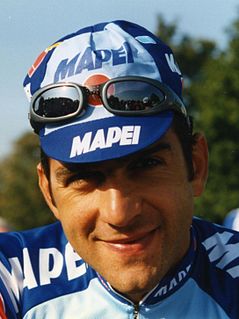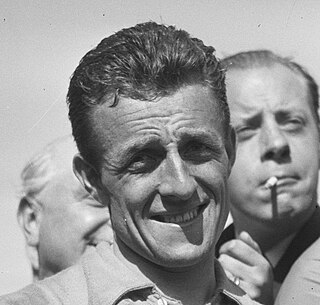
Rik Van Steenbergen was a Belgian racing cyclist, considered to be one of the best among the great number of successful Belgian cyclists.

The Giro d'Italia is an annual multiple-stage bicycle race primarily held in Italy, while also starting in, or passing through, other countries. The first race was organized in 1909 to increase sales of the newspaper La Gazzetta dello Sport; and is still run by a subsidiary of that paper's owner. The race has been held annually since its first edition in 1909, except during the two world wars. As the Giro gained prominence and popularity the race was lengthened, and the peloton expanded from primarily Italian participation to riders from all over the world. The Giro is a UCI World Tour event, which means that the teams that compete in the race are mostly UCI WorldTeams, with some additional teams invited as 'wild cards'.

Constant ("Stan") Ockers was a Belgian professional racing cyclist.

Alberic "Briek" Schotte was a Belgian professional road racing cyclist, one of the champions of the 1940s and 1950s. His stamina earned him the nickname "Iron Briek".

Roger De Vlaeminck is a Belgian former professional racing cyclist. He was described by Rik Van Looy as "The most talented and the only real classics rider of his generation". Nicknamed “The Gypsy” because he was born into a family of traveling clothiers, he is known for exploits in the cobbled classic Paris–Roubaix race, but his performances in other “Monument” races gave him a record that few can match. His record in Paris–Roubaix earned him another nickname, “Monsieur Paris–Roubaix”.

Henri "Rik" Van Looy is a Belgian former professional cyclist of the post-war period, nicknamed the King of the Classics or Emperor of Herentals. He was twice world professional road race champion, and was the first cyclist to win all five 'Monuments': the most prestigious one-day classics – a feat since achieved by just two others. With 379 road victories he's second to Merckx only. He is ninth on the all-time list of Grand Tour stage winners with thirty-seven victories.

Ferdinand "Ferdi" Kübler was a Swiss cyclist with 71 professional victories, including the 1950 Tour de France and the 1951 World Road Race Championship.

The 2006 Giro d'Italia was the 89th edition of the Giro d'Italia, one of cycling's Grand Tours. The Giro began in the Belgian city of Seraing with a 6.2 km (3.9 mi) individual time trial. The race came to a close with a 140 km (87.0 mi) mass-start road stage that stretched from Museo del Ghisallo to Milan. Twenty two teams entered the race that was won by the Italian Ivan Basso of the Team CSC team. Second and third were the Spain José Enrique Gutiérrez and Italian Gilberto Simoni.

Franco Ballerini was an Italian road racing cyclist.

Alfred De Bruyne was a Belgian champion cyclist.

Eddy Planckaert is a former professional road racing cyclist from Belgium. In 1988, Planckaert enjoyed perhaps his best year by capturing the green jersey at the 1988 Tour de France and winning the Tour of Flanders. In 1990, he won Paris–Roubaix, his second monumental classic, with the closest finish in the race's history beating Canadian Steve Bauer by less than a cm. A strong sprinter, Planckaert is one of the riders with stage wins at all three cycling Grand Tours.
The 1951 Giro d'Italia was the 34th edition of the Giro d'Italia, one of cycling's Grand Tours. The Giro started off in Milan on 19 May with a 202 km (125.5 mi) flat stage and concluded back in Milan with a 172 km (106.9 mi) relatively flat mass-start stage on 10 June. Fourteen teams entered the race, which was won by Italian Fiorenzo Magni of the Ganna team. Second and third respectively were Belgian Rik Van Steenbergen and Swiss rider Ferdinand Kübler.
The 1952 Giro d'Italia was the 35th edition of the Giro d'Italia, one of cycling's Grand Tours. The Giro started off in Milan on 17 May with a 217 km (134.8 mi) flat stage and concluded back in Milan with a 147 km (91.3 mi) relatively flat mass-start stage on 8 June. Sixteen teams entered the race, which was won by Italian Fausto Coppi of the Bianchi team. Second and third respectively were Italian Fiorenzo Magni and Swiss rider Ferdinand Kübler.
The 1950 Giro d'Italia was the 33rd edition of the Giro d'Italia, one of cycling's Grand Tours. The Giro started off in Milan on 24 May with a 225 km (139.8 mi) individual time trial and concluded in Salsomaggiore Terme with a 230 km (142.9 mi) relatively flat mass-start stage on 13 June. Fifteen teams entered the race, which was won by Swiss Hugo Koblet of the Guerra team. Second and third respectively were Italians Gino Bartali and Alfredo Martini.

Peugeot team was a French professional cycling team that promoted and rode Peugeot racing bikes.
Cycle racing is a popular sport in Belgium. It is governed by the Royal Belgian Cycling League since 1882, which became a founding member of the International Cycling Association in 1892 and later of the Union Cycliste Internationale in 1900. Since 2002, the Royal Belgian Cycling League is composed of the Wielerbond Vlaanderen (WBV), which governs the cycle racing in Flanders and of the Fédération Cycliste Wallonie-Bruxelles (FCWB), which governs the cycle racing in Wallonia and Brussels. Belgium has been one of the major countries in different categories of cycle racing over the years, including road cycling and cyclo-cross. The best Belgian cyclist of all times, Eddy Merckx, nicknamed the Cannibal, has won all of the 3 grand tours and all of the 5 monuments of cycling. He also won the UCI Road World Championships 3 times and set the hour record, among other achievements.

Carpano was an Italian professional cycling team that existed from 1956 to 1966. The team's main sponsor between 1956 and 1964 was the Turin-based wine company Carpano, with Fausto Coppi's bicycle company Coppi a co-sponsor for the first two seasons. When Carpano took sole sponsorship of the team, the team adopted black and white striped jerseys similar to the shirts worn by Turin's Juventus Football Club. For the final two years, 1965 and 1966, Italian food producer Sanson took over the sponsorship. Whilst with Carpano, Franco Balmamion won the general classification of the Giro d'Italia in 1962 and 1963.
The 1949 Challenge Desgrange-Colombo was the second edition of the Challenge Desgrange-Colombo. It included ten races: all nine races from the 1948 edition were retained and the Tour de Suisse added. The competition was won by Fausto Coppi of the Bianchi–Ursus who won four of the ten rounds: Milan–San Remo, the Giro d'Italia, the Tour de France and the Giro di Lombardia.
The 1951 Challenge Desgrange-Colombo was the fourth edition of the Challenge Desgrange-Colombo. It included eleven races: all the races form the 1950 edition were retained with the addition of Liège–Bastogne–Liège. Paris–Tours moved from a spring slot to an autumn slot. Louison Bobet won the competition by a single point to 1950 champion Ferdinand Kübler. France won their first nations championship.












